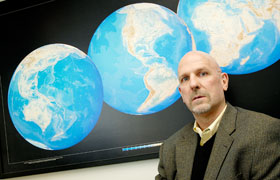  |
| HOME | THIS ISSUE | CALENDAR | GRANTS | BACK ISSUES | < BACK | NEXT > |
Former NSF official to head environmental research centerby Michael Kirk - March 13, 2006 | ||||
|
Michael Willig accepted the position as director of the new Center for Environmental Science and Engineering (CESE) at UConn because he believes that environmental problems will be the greatest challenges facing society in the 21st century, and that UConn has the resources to help combat them. “These problems – the spread of infectious diseases, loss of biodiversity, deterioration of air and water quality, loss of soil fertility, pervasiveness of pollution and biocides – are complex and pervasive,” says Willig. “They require multidisciplinary and integrated study to understand the mechanisms that govern the operation of environmental systems, as well as the principals that guide remediation, restoration, management, and policy. As a comprehensive research university as well as land and sea grant institution, UConn has the expertise to contribute significantly to a scientific enterprise addressing such issues.” Willig says he was attracted to UConn by “the quality and number of faculty members at UConn who address both basic and applied aspects of environmental issues, the commitment of the administration to integrative and multidisciplinary research, and the relationship the University has with various state agencies that focus on the environment.” He arrived at UConn in January from Texas Tech University, where he was a professor of biology. He also had been chair of the Department of Biological Sciences and headed Texas Tech’s Institute of Environmental Sciences. Previously, he received post-doctoral support from the U.S. Department of Energy at the Oakridge Laboratories, and was a professor at Loyola University. He also worked for the National Science Foundation twice, once as a program director for ecology, and most recently as division director for environmental biology. “Dr. Willig’s experience is exceptional and particularly relevant to his new position here,” says Gregory Anderson, dean of the graduate school and interim vice provost for research. “He has been awarded more than $17 million in research grants, has received numerous awards and honors, taught many courses at the undergraduate and graduate levels, and has published more than 125 peer-reviewed articles and five books and monographs. We are truly excited about the opportunities and experience Dr. Willig brings to the University.”
CESE is taking the place of what used to be known as the Environmental Research Institute at UConn, with all ERI’s functions being folded into CESE. As founding director of the new center, Willig says he hopes to build consensus with the faculty, advocate for environmental issues with the administration, be a catalyst for collaborative research and synthesis, and stimulate education about the environment across disciplines. “I see my role as leading the faculty to consensus concerning the directions that CESE will explore in the coming months,” he says. “I see CESE as having a broad mandate that reaches out to all schools and colleges and academic units involved in environmental research.” As part of a long list of priorities, Willig says his goals include articulating a clear strategy for accomplishing the general mission of CESE: developing a top-tier university-based center dedicated to environmental research, education, and outreach to improve human health and enhance environmental sustainability. During his first month in Storrs, Willig has been meeting with administrators and faculty across campus, to discuss his vision for CESE and to learn about their activities and priorities in environmental sciences and engineering. He is in the process of developing a multi-college assessment of expertise in environmental sciences and engineering, as well as creating an advisory committee for the center. “I think UConn can become a national and international leader in research with respect to environmental sciences and engineering,” says Willig. “I am excited about being a participant in this process of transforming and enhancing the productivity and reputation of the University.” |
| ADVANCE HOME UCONN HOME |

